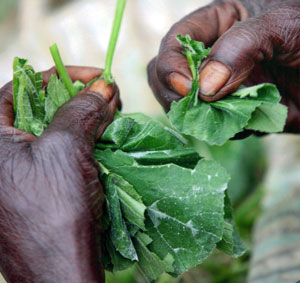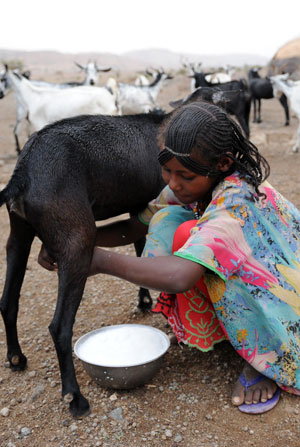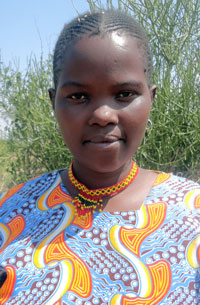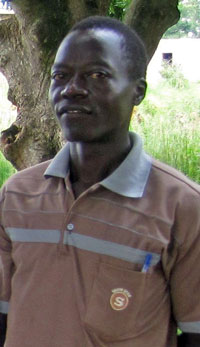- Highlights
- Overview
- Key figures
- Agricultural support to smallholder farmers
- Assisting smallholder farmers to diversify their income
- Strengthening advocacy platforms for smallholder farmers
- Promoting legal rights
- Challenges
Case studies:
- The Story of Susan Apua: Small holder farmer from Kikali, Kenya
- The Experience of Benon Okeng: Community Volunteer in Lira, Uganda
Highlights
As part of the CARE program in Chaola Village in Dowa, Malawi, a woman prepares pumpkin leaves for cooking. Pumpkin leaves, okra and nsima (hard porridge made from maize flour) are staple foods for families in Malawi. Photo: Josh Estey/CARE
Ethiopia
CARE's partner SoS Sahel trained and provided 700 marginalised smallholder farmers with improved seed varieties and beehives. 52 women-headed households were trained in livestock husbandry and feed development. Farmers were also assisted with the formation of 13 producer groups, 2 savings and credit co-operatives and 25 savings groups.
Kenya
ActionAid established a partnership with the Kenya Producers Coalition that will train women smallholder farmers to collect evidence on the effect and implementation of government policies and to present their findings to policymakers and government.
Malawi
Building on the strengths-based approach training from Caritas partner CADECOM, vulnerable households identified and tilled a nine-hectare irrigation site and engaged experts from local government to assist in their efforts. The plot will benefit 119 households from 11 villages, including 8 households with people living with disability.
Uganda
A total of 410 people used legal services offered by Plan International project staff and community volunteers, 73 per cent being women and girls. Land disputes and inheritance cases were a significant proportion of those handled handled through alternative dispute resolution, mediation and counselling. These cases represented 33 per cent in Kamuli district, 34 per cent in Lira district and 20 per cent in Kawempe division of Kampala.
Zimbabwe
AFAP's partner, Community Technology Development Trust (CTDT) introduced mechanised conservation agriculture through the use of the Jambo Direct Seeder (an ox-drawn implement). The machine was acquired by CTDT after staff learned of it during the World Conservation Agriculture Conference organised by the Australian Centre for International Agricultural Research in Brisbane, Australia. The use of the Jambo Seeder is expected to increase crop hectarage and reduce the amount of manual labour required.
Overview
Just over one in four people (26.9 per cent) living in Sub-Saharan Africa are undernourished.1 In per capita terms, Sub-Saharan Africa populations continue to be the most food insecure in the world. Rising food prices are worsening the situation in many countries. Although governments in countries where AACES operates support agricultural development as a path to food security, lack of investment in the sector, particularly small-scale farming, still prevails. AACES partners strive to improve food security at the community level by addressing underlying problems such as limited agricultural resources and inputs that result in poor crop yields among other challenges. In particular, these challenges can affect women and result in wide gender disparities in accessing land, livestock and capital. This negatively affects food security as women often have very limited access to the means of production, despite comprising the majority of farm labour and accounting for more than 80 per cent of household food production.2 Despite the challenges that women farmers face, they have much potential including skills, knowledge and experience, which can be developed.
Key figures
AACES has had a positive impact on food security by assisting:
- 13,000 households to adopt new agricultural technologies that will increase farm yields
- 3,300 households to access farm inputs such as tools, seeds and livestock
- 12,500 farming households to access new or improved agricultural services
- 3,500 smallholder farmers to join farmer associations that provide technical support, information and knowledge sharing
- 28,700 people to increase awareness on their rights to land, food and access to government agricultural services
2011-12, ActionAid, CARE, Australian Foundation for the Peoples of Asia and the Pacific Ltd (AFAP), Caritas and Plan International successfully laid the foundation for creating more empowered smallholder farmers through various food security interventions.
Key areas of support included:
- agricultural support to smallholder farmers
- assisting smallholder farmers to diversify their income
- strengthening advocacy platforms for smallholder farmers.
Agricultural support to smallholder farmers
Program partners supported smallholder farmers by equipping them to better cope with climate change through introducing them to drought-tolerant crops and sustainable farming practices. They were able to expand and sustain their agricultural activities through these and other activities such as seed and fertiliser distribution, agricultural extension service support and sharing of experiences and learning. As a result, they have improved food security in their communities.
Input support, training and extension services
In response to erratic rains, program partners distributed drought-resistant seed varieties to smallholder farmers. In Kenya, ActionAid distributed drought-tolerant seeds for important food crops, including sorghum, millet, cassava stalks and sweet-potato vines, to farmers in the 74 Farmer Field Schools that they established. Women smallholder farmers benefited from training in the use of drought-tolerant seeds to which they had not previously had access. Beyond the provision of seed, AACES agricultural interventions resulted in many communities building seed banks that enabled access to improved seed beyond the life of the program.
In addition, AACES partners encouraged farmers to use appropriate farming practices such as self-prepared composts and integrated management of pest control and soil nutrition. In the first year, some communities reported marked improvements in yields from the support they received. In Dowa district, Malawi, Caritas's partner CADECOM reported a significant increase in yields for 1000 families due to improved farming techniques and input distribution. Maize yields increased from an average of 100kgs to 750kgs per acre. Groundnut yields per acre have likewise increased from 25kgs to 200kgs.
Program partners also trained extension service providers and farmers. The training further built the capacity of smallholder farmers with the technical aspects of extension work. These included timely planting of crops, proper spacing, better weeding techniques, and application of fertilisers among others. In Malawi, CARE worked with communities to train and increase the number of female extension workers. CARE also distributed bicycles to enable extension officers to reach more than 8000 households.
Learning and innovation
AACES partners supported farmer groups to learn from each other. The farmer groups became important for making available various agricultural support services and for enabling more women to take up visible leadership roles. An example is the farmers' clubs supported by Caritas in Malawi, which will support 60 groups in the three program sites – Dowa, Rumphi/Mzimba and Phalombe – each with a demonstration field where more than 8000 households will learn from each other. ActionAid has a similar structure of 74 Farmer Field Schools in Kenya, with a membership of 1375 women and 472 men.
ActionAid also has 80 reflect groups3 in Uganda which have a membership of 2909 (nearly 70 per cent of whom are women). These groups have facilitated training on topics such as dry-land farming technologies and land preparation. By learning from each other, farmers have increased efficiency. In Uganda, reflect farmer groups have independently revived the practice of using collective labour in peak times, such as during planting and weeding, and have agreed to share animals to plough land.
Assisting smallholder farmers to diversify their income
As climate change impacts increase vulnerability in the Afar region, Ethiopia, there has been a shift in livestock ownership towards drought hardy goats. From a young age both boys and girls work at managing and milking their highly valued animals. APDA assists communities to increase their resilience to drought impacts by maintaining healthy herds. Photo: Christof Krackhardt/Fioto Organico
Program partners recorded significant achievements through supporting marginalised households, particularly female-headed households, to be food secure through diversifying their sources of income and increasing opportunities for income generation.
Livestock: Livestock production plays a very important role in the social and cultural life of rural Africa. Program partners supported chronically poor and vulnerable households with livestock and poultry that reproduce easily, including larger productive livestock such as heifers. In Uganda, ActionAid assisted farmers to purchase heifers, oxen, sheep and goats. Farmers assisted were mainly women. The program also worked with farmers with disabilities, the elderly, widows, single mothers and those living with HIV/AIDS. A government veterinary officer helped farmers select healthy animals and the type of oxen drawn plough which is more suitable for women to use. In Ethiopia, one of the objectives of the livestock program was to improve the status of women who own very few livestock. CARE identified 1200 women to rear goats and sheep, while Trainers of Trainers were taught to enhance animal husbandry activities in communities. In Malawi, AFAP's partner Concern Universal distributed livestock using a voucher system in the Mphuka district. The voucher system empowered beneficiaries to choose the best livestock and bargain on the price. The livestock were sourced within the locality and were well adapted to the local environment. A total of 285 households (125 male headed and 160 female headed) benefited from the distribution.
Income generation activities for women: Program partners worked on improving the economic and social status of women living in households experiencing chronic hunger. This was done through the provision of opportunities to earn income from a greater variety of sources. An example of such a program is the CARE Village Savings and Loans Associations (VSLAs) program in Malawi and Ethiopia which supported 530 groups.4 The VSLAs have become a vital entry point for building the strength of women's activities in business, savings and off-farm income-generation activities.
Strengthening advocacy platforms for smallholder farmers
In the first year, AACES made significant progress in building strong and vibrant communities that are better able to collectively bargain and influence government policy.
An important approach used to achieve this was creating links between smallholder farmers and relevant agricultural networks, as well as with civil society groups at district, national and global level, to lobby and advocate more effectively for their rights with regard to land and food.
In addition, program partners provided women smallholder farmers with greater opportunity and skills to voice their needs and priorities by supporting the formation of lobby and accountability groups. In Uganda, the work by lobby groups with the National Agricultural Advisory Service, supported by ActionAid, opened dialogue on accessing agricultural support and services. Another example was the successful creation by CARE of the Gender and Agriculture Learning Alliance (GALA) in Tanzania, which enabled smallholder farmers to engage with decision-makers. At the first GALA meeting, local government demonstrated its commitment and support by placing GALA under the coordination of the Regional Coordination Committee, with CARE as the lead organisation. The government took this step after recognising that CARE will add value to their coordination efforts in the agriculture sector, especially in relation to gender issues. This is an early promise of program sustainability for GALA in the region and will be a real boost to GALA's operations, should local government commit funds and personnel to run it.
Promoting legal rights
AACES programs acknowledge that the quality of life for people in marginalised groups is improved when programs address both rights as well as basic needs. In the inception year of the program, AACES made progress in improving food security through raising awareness among stakeholders and marginalised people of the rights of rural people. Culture and other barriers often prevent women in many countries from owning and inheriting land and, as a result, women often lose land after their husbands' deaths, separation or divorce. Promoting women's rights to land and resources is central to enabling them to feed themselves and their families. To support this, AACES partners provided training to communities on food security rights thereby creating a stronger basis for women to demand access to and control over resources.
In Uganda, Plan International conducted awareness and training sessions to help community members, particularly women, understand their legal rights with regard to land. They also facilitated access to legal services provided by project staff (who are lawyers), community volunteers, local authorities and community leaders trained through the project.
75 mobile legal aid clinics conducted by Plan International provided community education on rights as well as access to free legal services. Over 7000 people, 62 per cent of them women and girls, attended at least one rights-awareness training session on a number of issues that included the Land Act, succession and inheritance. AACES partners also trained community and local government leaders to strengthen their capacity to deliver services that respect and protect the rights of women and girls.
Challenges
While significant progress was made during 2011–12 in delivering food security interventions, program partners encountered some challenges that slowed down the pace of implementation or required project adjustment.
The challenges included low and erratic rainfall patterns for farmers who rely on rain fed agriculture, high illiteracy among women, social and cultural barriers and various country specific political, social and economic problems.
In addressing the various challenges faced by smallholder farmers, program partners promoted water and soil conservation techniques, water harvesting and provided cheaper irrigation equipment. Partners introduced literacy programs to overcome the challenge of women's illiteracy and implemented programs that educated men on gender issues and national law, as well as community-based programs which draw on communities' cultural values to promote more positive practices.
The Story of Susan Apua: Small holder farmer from Kikali, Kenya
Turning a New Leaf
Susan Apua
A clear vision, a bit of help from a farmer field school, technological innovation, availability of water and a lot of hard work–that is Susan Apua's recipe for success as a smallholder farmer.
Susan (36) speaks softly, but quickly and with intensity. A woman of the soil, she tills her plot in Kikali, a village in Isiolo Kenya with a group of 17 other women and seven men. Susan and her group belong to the Meritapan Farmer Field School, supported by ActionAid.
Produce from her plot helps to feed 12 children (six of whom were placed under her care following the death of her husband's brother).
But only a year ago Susan and her family survived solely on food aid from donor agencies following a series of droughts that decimated both crops and livestock. The effects of climate change, cattle rustlers and the lack of resources to buy seed, farming equipment and food saw her family drown in poverty. As a result her children suffered from malnutrition.
Today, after joining the Meritapan Farmer Field School in 2011, Susan has nearly tripled the output from her plot because of hard work and new systems of farming that have greatly improved crop quality and output. Susan's farmer group meets every week to exchange ideas and share life experiences–in the process increasing community social cohesion.
ActionAid has assisted Susan and other farmers in Kikali by improving irrigation and introducing new planting techniques. A water pump, pipes, drought tolerant seeds and seedlings that farmers received when the program began have almost tripled users' crop yields, while the use of technology in farming has saved labour time for women. In addition, knowledge from extension officers has helped farmers to make better use of the soil.
Susan now plants a variety of crops all year round. The crops she grows include maize, cowpeas, tomatoes, spinach, onion, and sweet potatoes. Her income has increased accordingly and her children eat more nutritious food.
'Since I joined the Field Farmer School introduced by ActionAid, I am now selling spinach and cowpea leaves once every week at the vegetable market. I make an average of 600 Kenyan Shillings [A$7.50]. From the proceeds I have managed to purchase three rabbits at 1000 Kenyan Shillings [A$12.50]. I now contribute to household income and my children no longer go hungry,' Susan says with a broad smile on her face.
With her changing fortunes, Susan is planning to 'graduate' from food aid the moment she harvests this season. She concludes by saying 'my life has turned over a new leaf, I will never look back. I will focus my energy on the future.'
The Experience of Benon Okeng: Community Volunteer in Lira, Uganda
From perpetrator to rights advocate
Susan Apua
In November 2011, Plan International's Promoting Rights and Accountabilities in African Communities (PRAAC) project staff facilitated a community meeting in Benon Okeng's village. At that meeting, Benon, a married man with four children was selected by his village to take on a new community volunteer role to work with the PRAAC project. Soon after, Benon became one of 42 new community volunteers who participated in a five day training workshop on human rights and law in Lira town. The workshop covered Uganda's laws on domestic violence, land, marriage and divorce, succession and inheritance. Here Benon describes the impact of the training in his life:
'Before the training–like many people–I did not know anything about land laws. When my brother passed away suddenly, the clan appointed me heir to his estate. People told me that I could use the land that my brother and his wife had been farming. My brother's widow objected to my using the land, so I chased her away. I made money from the sale of the crops grown on that land but did not share the money with my sister-in-law.
'When I learnt about land laws and human rights at the training workshop, I realised that I had wronged my sister-in-law. When I returned home after the training, I went to see my sister-in- law. I told her that I had broken the law and she was free to use the land now; she should only consult me if she wanted to rent or sell the land.
'At first, my sister-in-law did not trust me but then she realised that I had changed. I have given her back responsibilities over the land. Our relationship has improved. She informs me if she is going to rent the land and asks me to help her with farming tasks. Her children are now back in school and I pay school fees for her daughter. I still use the land but only after she gives her permission.
'That training on human rights and the law changed me. Now I know that a widow has rights to her family land; it should not be taken away by her husband's relatives. I now have a good relationship with my sister-in-law. The change in my behaviour has earned me respect in the community and community members trust and consult me. In the past, people here did not have anywhere to go when faced with land disputes. Now I provide advice on the law and mediate disputes free of charge. I am a role model to other community members. The example of how I have changed influences people to change and uphold the rights of others. It's more rewarding to live positively, to create peace and harmony in the community than to abuse people's rights.'
1 FAO, The State of Food Insecurity in the World 2012, accessed from www.fao.org/docrep/016/i3027e/i3027e02.pdf
2 FAO, Women and Sustainable Food Security, 2011, accessed from www.fao.org/sd/fsdirect/fbdirect/FSP001.htm
3 Reflect is an innovative and diverse approach to adult learning and social change. It links learning to empowerment by enabling people to articulate their views and has been successful for women empowerment.
4 On average each group has 17 members.




